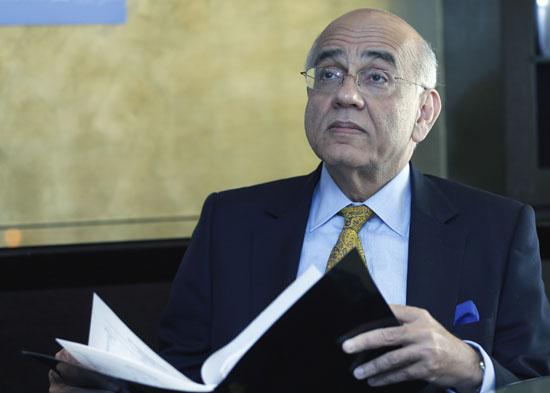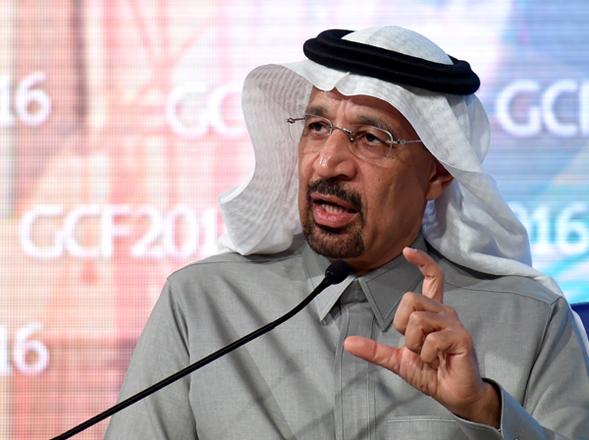You are here
Gulf oil exporters should cut spending, diversify — IMF
By Agencies - May 05,2015 - Last updated at May 05,2015

DUBAI — Gulf oil exporters must reduce spending, including subsidies and diversify their economies to cope with lower revenues caused by the sharp drop in crude prices, the International Monetary Fund (IMF) said.
The wealthy monarchies, however, should "not react in a knee-jerk way to lower oil prices", the IMF Middle East and Central Asia chief Masood Ahmed told AFP in an interview Monday.
They would be better off to "adjust gradually" using the large financial reserves they have accumulated during several years of bumper oil receipts, he said in Dubai.
But as oil prices have dropped lower than budgeted breakeven levels, "it is important that they gradually, but in a determined way... reduce their spending [and] consolidate their fiscal position," Ahmed added.
Oil prices have shed half of their value since June 2014, and are expected to be lower than the breakeven point for Gulf countries in the next three to four years.
The Gulf Cooperation Council (GCC) includes Bahrain, Kuwait, Oman, Qatar, Saudi Arabia and the United Arab Emirates (UAE), economies all heavily dependent on energy revenues.
A combined budget surplus for 2014 of $76 billion (68.5 billion euros) is expected to turn into a deficit of $113 billion this year, the IMF indicated in its latest regional report.
"They need to act to reinforce their efforts to diversify their economies to become less dependent on oil," said Ahmed, pointing out that many have already taken such measures.
"The UAE is more advanced in terms of diversification. The others also are in varying degrees trying to encourage private sector activity outside the oil area," he added.
Curb subsidies
GCC countries were also urged to cut energy subsidies in a bid to minimise public spending and trigger a change in consumer behaviour.
"Most GCC countries still have the domestic sale price for energy products below the international prices... We think that over time it is important to tackle the issue of energy subsidies to reduce them," Ahmed stressed.
Gulf states should also contain salary growth in the public sector, which usually employs nationals as opposed to the private sector that depends on millions of foreigners.
In addition, GCC countries would need to prioritise investment projects that "most advance the development agenda”, said Ahmed.
Oil-export revenues for GCC countries are forecast to be $280 billion lower this year than a year ago.
With the exception of gas-rich Qatar and Kuwait, all GCC states are expected to face budget deficits this year, said Ahmed, noting that this could persist for two or three years.
"The important thing to recognise is that GCC countries have built up financial buffers that put them in a very strong position to be able to use these savings to finance expenditure and to have a gradual decrease in spending over the coming years," he added.
This in turn would minimise the economic impact of the drop in oil prices.
GCC states are estimated to have foreign reserves of about $2.5 trillion.
"The impact on [economic] growth is quite limited," said Ahmed.
The IMF has forecast GCC countries to grow as a group at 3.4 per cent in 2015, one percent down from earlier predictions, mainly because of a slowdown in non-oil growth in response to lower oil prices.
The forecast did not account for fallout from the conflict in Yemen, where a Saudi-led coalition launched in March an air campaign against Iran-backed Shiite rebels in support of exiled President Abdel Rabbo Mansour Hadi.
Ahmed said it was too early to assess the impact of the campaign on Saudi Arabia, which is leading daily air strikes, but said the kingdom's financial buffers will help meet the cost.
"It will be one source of additional pressure," he said, adding however that the "Saudi government has the financial reserves to be able to underwrite the budget deficit."
Separately, Saudi Arabia is restructuring the world's biggest energy company, Saudi Aramco, in a move apparently aimed at letting it operate more at arm's length from the powerful oil ministry.
Analysts expected technocrats to get a freer hand in running the state-owned giant. Some said the restructuring might be the first step in a shake-up of the Saudi energy sector and could possibly pave the way for a prince to take over the ministry itself, which is traditionally run by industry experts rather than members of the royal family.
Citing unnamed sources, Saudi-owned Al Arabiya TV reported on Friday that Aramco would be separated from the oil ministry of the top member of the Organisation of Petroleum Exporting Countries (OPEC). Aramco officials could not be immediately reached for comment but Arabiya's reports closely reflect official thinking.
According to Mohammad Al Sabban, a former senior adviser to oil minister Ali Al Naimi, the move would strengthen Aramco.
"This decision will bring more flexibility to the company to take decisions on a commercial basis, and keep full financial control," he said.
Conventional thinking is that the ruling Al Saud family views the oil minister's job as so important that giving it to a prince might upset the dynasty's delicate balance of power and risk leaving oil policy hostage to princely politicking.
But Ehsan Ul-Haq, oil analyst at KBC Energy Economics, said it was highly likely that Prince Abdul Aziz Bin Salman, a son of King Salman, could be appointed to replace 79-year-old Naimi, who has been oil minister since 1995.
The king promoted Prince Abdul Aziz, long a member of Saudi Arabia's OPEC delegation, to deputy oil minister from assistant oil minister earlier this year. Some diplomatic and Saudi sources have suggested his years of experience might overcome the hurdles to a royal becoming oil minister.
"They are trying to rearrange Aramco and restructure the whole company. They are also trying to restructure the oil ministry and name Prince Abdul Aziz as minister of energy," said an industry source in Saudi Arabia.
"So that way, Aramco will be totally business-oriented, not an arm of the petroleum ministry," he added.
Major reshuffle
Aramco was once US-based and run by Americans but has long been a Saudi state corporation. It dwarfs all others in the industry, with crude reserves of 265 billion barrels, more than 15 per cent of all global oil deposits.
It produces over 10 million barrels per day, three times as much as the world's largest listed oil company, ExxonMobil , while its reserves are more than 10 times bigger. If Aramco were ever to go public, it would probably become the first company to be valued at $1 trillion or more.
As part of a major reshuffle on Wednesday, King Salman moved Khalid Al Falih from chief executive to chairman of Aramco and also appointed him health minister, changes that may indicate Falih will not become oil minister, Ul-Haq said.
"[Falih's] shift to the health ministry suggests that he might not follow Naimi. His appointment to the chairman of Aramco, on the other hand, is only ceremonial," he added.
Aramco's senior vice-president Amin Al Nasser has been named acting chief executive until further notice, the company said on its Twitter account on Friday. Earlier, it had posted a statement saying Aramco has a new 10-member supreme council headed by the kingdom's deputy crown prince.
"The Saudi Supreme Economic Council agrees on Deputy Crown Prince Mohammed Bin Salman's vision of restructuring oil giant Aramco," Arabiya reported on its Twitter account. "Restructuring of Saudi Aramco includes separation from the petroleum ministry."
The Supreme Economic Council, formed by King Salman earlier this year, replaces the Supreme Petroleum Council, which used to help set the kingdom's oil policy.
The new council is headed by Deputy Crown Prince Mohammed, another son of the king, a move seen by analysts as laying the ground for a generational shift in how Riyadh develops its energy and economic strategies.
The main tenets of Saudi oil policy, including maintaining the ability to stabilise markets via an expensive spare-capacity cushion and a reluctance to interfere in the market for political reasons, are set by the top members of the ruling Al Saud family.
Oil minister Naimi, who has seen several oil price crashes during his tenure, was the driving force behind OPEC's decision in November not to cut production to support prices, which have halved since June 2014, but rather maintain its market share.
On Thursday, Naimi was quoted as saying that King Salman's appointment of two new heirs would help stabilise world oil markets by strengthening political stability in the kingdom.
Related Articles
RIYADH — Saudi Arabia's King Salman on Saturday replaced his veteran oil minister and restructured some big ministries in a major reshuffle
DUBAI/RIYADH — A shake-up of Saudi Arabia's oil leadership by King Salman has introduced a new element of unpredictability to its energy pol
RIYADH – The new energy minister of Saudi Arabia, the world's biggest oil exporter, on Sunday pledged continuity in the kingdom's oil policy















